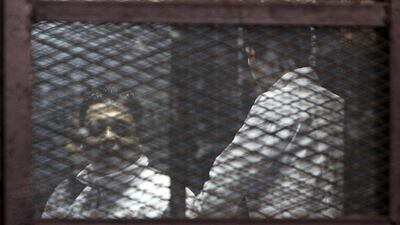CAIRO // An Egyptian court on Monday sentenced 183 people to death over the ransacking of a police station and the killing of 15 policemen after the 2013 removal of president Mohammed Morsi. The verdict was the latest in a string of mass death sentences that have sparked local and international condemnation.
The charges are related to the bloody August 2013 ransacking of a police station in the village of Kerdassah, near Cairo. The attackers killed 15 officers, including the police chief, and mutilated some of the bodies.
The assault was believed to be revenge by Morsi loyalists for the government’s crackdown on the Muslim Brotherhood.
Mr Morsi, a longtime Brotherhood official, was ousted by the military in July 2013 following mass protests against his rule. Mr Morsi’s supporters staged two large public sit-in protests in Cairo, which were harshly broken up by police on August 14, 2013 — killing hundreds of Brotherhood cadres. The attack on the Kerdassah police station began a few hours after the Brotherhood sit-ins were cleared.
Monday’s verdict was issued by judge Mohammed Nagi Shehata, who has developed a reputation for harsh sentences against perceived government critics.
Mr Shehata previously sentenced a trio of prominent revolutionary activists to prison for violating a new law against unauthorised demonstrations. He also sentenced three journalists from Al Jazeera English to jail terms ranging from 7 to 10 years; one of those journalists, Australian Peter Greste, was released and deported on Sunday, while the other two remain in prison.
Other judges have also handed down mass death sentences against Brotherhood supporters, including more than 1000 in a pair of mass trials that were heavily criticised by international human rights groups. Many of those sentences were later overturned on appeal, and in one incident, a judge was removed.
Mr Morsi is, himself, facing multiple trials over his one-year reign – including charges of conspiring with foreign groups and authorising the killing of protesters. He is scheduled to begin a new trial on February 15 over charges of allegedly leaking “classified documents” to Qatar and Al Jazeera television, a judicial source said on Monday.
Mr Morsi and nine others, including an Al Jazeera employee, are accused of “handing over to Qatar intelligence documents linked to national security in exchange for one million dollars”, a prosecution statement said.
It said the case against the suspects, of whom seven are in custody, represented “the biggest act of treason and espionage” ever carried out against Egypt.
Mr Morsi is already on trial in three separate cases – one for the killing of protesters during his presidency, another for allegedly conspiring with foreign powers including Iran to destabilise Egypt, and a third over a jailbreak and attacks on police stations during the 2011 uprising that ousted president Hosni Mubarak.
Trials against Mr Morsi and several leaders of his Muslim Brotherhood are part of a crackdown targeting his supporters that has left hundreds dead, thousands jailed and hundreds sentenced to death after speedy trials.
Qatar had always supported Mr Morsi and his Muslim Brotherhood, which posted strong electoral gains after Mubarak's removal.
In the latest trial, Mr Morsi’s co-defendants include: his former secretary, Amin El Serafi, the ex-director of his office, Ahmed Abdel Atti, and Ibrahim Mohamed Helal, identified as a chief editor of Al Jazeera television.
Mr Morsi and Abdel Atti gave Mr El Serafi “extremely sensitive documents concerning the army, its deployment and weaponry”, and he then passed them to Mr Helal and a Qatari intelligence operative, according to the prosecution.
It said unidentified intermediaries were used to send the documents to Mr Helal and the Qataris.
The papers included documents from the “general and military intelligence offices of the state security” apparatus, the prosecutor said.
Relations between Egypt and Qatar soured after Mr Morsi’s removal.
Diplomatic ties between Cairo and Doha have been improving since a regional summit hosted by Riyadh in November at which Qatar joined its Arabian Gulf neighbours in supporting Egypt under president Abdel Fattah El Sisi.
* Associated Press, Agence France-Presse

